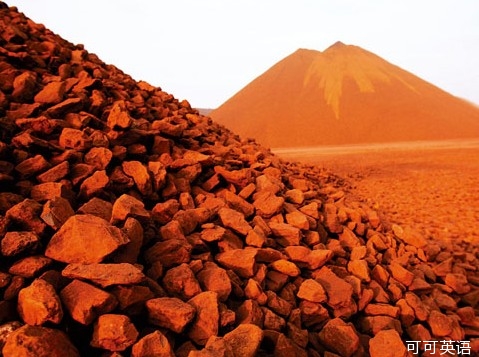
Billions of dollars were wiped off the market value of the world’s biggest mining companies yesterday after fresh concerns about slowing demand from China prompted one of the steepest falls in the price of iron ore on record.
全球幾家大型礦企的市值昨日蒸發(fā)了數(shù)十億美元,原因是中國需求放緩再度引起擔(dān)憂,導(dǎo)致鐵礦石價(jià)格出現(xiàn)有記錄以來最大跌幅之一。
Benchmark iron ore delivered into China dropped 8.3 per cent to an 18-month low of $104.70 a tonne – its second-biggest one-day percentage fall on record – according to the Steel Index price reporting agency.
價(jià)格報(bào)告機(jī)構(gòu)鋼鐵指數(shù)(Steel Index)數(shù)據(jù)顯示,發(fā)往中國的基準(zhǔn)鐵礦石價(jià)格下跌了8.3%,至每噸104.7美元的18個(gè)月低位,創(chuàng)下有記錄以來第二大單日跌幅。
Iron ore is the main commodity used in steel making and is critical to the profitability of mining companies such as Anglo American, BHP Billiton, Rio Tinto and Vale. They are spending billions of dollars expanding operations to meet expected demand for steel from Chinese construction projects.
鐵礦石是用于煉鋼的主要大宗商品,對于英美資源集團(tuán)(Anglo American)、必和必拓(BHP Billiton)、力拓(Rio Tinto)和淡水河谷(Vale)等礦企的盈利能力至關(guān)重要。這些礦企正投入數(shù)十億美元擴(kuò)大經(jīng)營規(guī)模,以滿足預(yù)期的中國建設(shè)項(xiàng)目對鋼材的需求。
However, if the iron ore price were to stay low for a sustained period of time, it would call into question the ability of miners to fulfil promises of higher returns for shareholders.
然而,如果鐵礦石價(jià)格持續(xù)徘徊在低位,礦企能否兌現(xiàn)承諾、為股東提供更高回報(bào)將成為疑問。
Investors have been warming to the mining sector after several years of underperformance as a new generation of chief executives promises a greater focus on returns rather than investment in big new projects. BHP and Rio, the two largest mining companies by market value, last month held out the prospect of higher dividends and potential share buybacks as early as this year.
礦企數(shù)年表現(xiàn)偏弱之后,投資者此前對礦業(yè)板塊態(tài)度回暖,因?yàn)樾乱淮V企首席執(zhí)行官承諾將更加注重提高回報(bào),而不是投資于大型新項(xiàng)目。上月,全球市值最大的兩家礦企——必和必拓和力拓——承諾最早于今年提高股息,并可能實(shí)施股票回購。
Analysts at BMO Capital Markets expect iron ore to generate 58 per cent of the pre-tax profits made by the seven largest diversified miners this year.
蒙特利爾銀行資本市場(BMO Capital Markets)分析師預(yù)計(jì),今年鐵礦石對全球七大多元化礦企稅前利潤的貢獻(xiàn)將達(dá)到58%。
“Expectations that some miners may be able to return cash to shareholders later this year are built on a strong iron ore price. Certainly for BHP and Rio, prices under $100 per tonne would significantly cut the chances of a special cash return,” said Tony Robson, co-head of global mining research at BMO.
蒙特利爾銀行資本市場礦業(yè)研究全球聯(lián)合主管托尼•羅布森(Tony Robson)說:“有些礦企今年晚些時(shí)候向股東返還現(xiàn)金的預(yù)期,建立在鐵礦石價(jià)格維持在高位的基礎(chǔ)上。對于必和必拓和力拓而言,如果鐵礦石價(jià)格低于每噸100美元,向股東提供特別現(xiàn)金回報(bào)的幾率肯定會(huì)大大降低。”
Shares in BHP have fallen almost 4 per cent in the past two trading sessions, while Rio is down more than 5 per cent. Anglo American, which is investing in iron ore production in Brazil, has dropped more than 7 per cent.
過去兩個(gè)交易日里,必和必拓股價(jià)下跌近4%,而力拓股價(jià)下跌逾5%。正投資于巴西鐵礦石項(xiàng)目的英美資源集團(tuán)股價(jià)下跌逾7%。
The iron ore price has plunged 22 per cent since the year’s start as fears about slowing growth in China, which consumes two-thirds of the world’s seaborne iron ore, have intensified. That has taken it into a bear market, defined as a 20 per cent drop from a recent peak.
隨著中國增長放緩引起的擔(dān)憂加劇(中國消費(fèi)量占到全球海運(yùn)鐵礦石的三分之二),鐵礦石價(jià)格自今年初以來下跌了22%。這意味著鐵礦石市場陷入熊市——價(jià)格比上一個(gè)峰值低20%即為熊市。
The sudden drop in the iron ore price followed disappointing Chinese trade data and a fall in domestic steel futures, which slid to a record low. Traders also said a 90,000 tonne cargo of benchmark Australian iron ore for delivery in May had traded at $104 a tonne. A similar shipment for April delivery had sold for $112.50 tonne on Friday.
鐵礦石價(jià)格突然下跌,源于中國發(fā)布令人失望的貿(mào)易數(shù)據(jù),以及國內(nèi)期鋼價(jià)格跌至創(chuàng)紀(jì)錄低位。交易員也表示,今年5月交貨的9萬噸基準(zhǔn)澳大利亞鐵礦石的價(jià)格為每噸104美元。而上周五,今年4月交貨的數(shù)量差不多的澳大利亞鐵礦石的價(jià)格為每噸112.50美元。
Chinese steel demand has been tepid since January as slowing economic growth has curbed demand for the material.
中國對鋼材的需求自今年1月以來持續(xù)低迷,因?yàn)榻?jīng)濟(jì)增長放緩抑制了對這種材料的需求。


